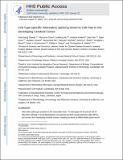| dc.contributor.author | Zhang, Xiaochang | |
| dc.contributor.author | Chen, Ming Hui | |
| dc.contributor.author | Kodani, Andrew | |
| dc.contributor.author | Fan, Jean | |
| dc.contributor.author | Doan, Ryan | |
| dc.contributor.author | Ozawa, Manabu | |
| dc.contributor.author | Ma, Jacqueline | |
| dc.contributor.author | Yoshida, Nobuaki | |
| dc.contributor.author | Reiter, Jeremy F. | |
| dc.contributor.author | Black, Douglas L. | |
| dc.contributor.author | Kharchenko, Peter V. | |
| dc.contributor.author | Walsh, Christopher A. | |
| dc.contributor.author | Sharp, Phillip A. | |
| dc.contributor.author | Wu, Xuebing, Ph. D. Massachusetts Institute of Technology | |
| dc.date.accessioned | 2018-07-09T18:04:58Z | |
| dc.date.available | 2018-07-09T18:04:58Z | |
| dc.date.issued | 2016-08 | |
| dc.date.submitted | 2016-05 | |
| dc.identifier.issn | 0092-8674 | |
| dc.identifier.issn | 1097-4172 | |
| dc.identifier.uri | http://hdl.handle.net/1721.1/116859 | |
| dc.description.abstract | Alternative splicing is prevalent in the mammalian brain. To interrogate the functional role of alternative splicing in neural development, we analyzed purified neural progenitor cells (NPCs) and neurons from developing cerebral cortices, revealing hundreds of differentially spliced exons that preferentially alter key protein domains—especially in cytoskeletal proteins—and can harbor disease-causing mutations. We show that Ptbp1 and Rbfox proteins antagonistically govern the NPC-to-neuron transition by regulating neuron-specific exons. Whereas Ptbp1 maintains apical progenitors partly through suppressing a poison exon of Flna in NPCs, Rbfox proteins promote neuronal differentiation by switching Ninein from a centrosomal splice form in NPCs to a non-centrosomal isoform in neurons. We further uncover an intronic human mutation within a PTBP1-binding site that disrupts normal skipping of the FLNA poison exon in NPCs and causes a brain-specific malformation. Our study indicates that dynamic control of alternative splicing governs cell fate in cerebral cortical development. Keywords: filamin A; Ninein; Ptbp1; Rbfox; microcephaly; periventricular nodular heterotopia; mother centriole | en_US |
| dc.description.sponsorship | National Cancer Institute (U.S.) (Grant P01-CA42063) | en_US |
| dc.publisher | Elsevier | en_US |
| dc.relation.isversionof | http://dx.doi.org/10.1016/J.CELL.2016.07.025 | en_US |
| dc.rights | Creative Commons Attribution-NonCommercial-NoDerivs License | en_US |
| dc.rights.uri | http://creativecommons.org/licenses/by-nc-nd/4.0/ | en_US |
| dc.source | PMC | en_US |
| dc.title | Cell-Type-Specific Alternative Splicing Governs Cell Fate in the Developing Cerebral Cortex | en_US |
| dc.type | Article | en_US |
| dc.identifier.citation | Zhang, Xiaochang et al. “Cell-Type-Specific Alternative Splicing Governs Cell Fate in the Developing Cerebral Cortex.” Cell 166, 5 (August 2016): 1147–1162 © 2016 Elsevier Inc | en_US |
| dc.contributor.department | Massachusetts Institute of Technology. Computational and Systems Biology Program | en_US |
| dc.contributor.department | Massachusetts Institute of Technology. Department of Biology | en_US |
| dc.contributor.department | Koch Institute for Integrative Cancer Research at MIT | en_US |
| dc.contributor.mitauthor | Wu, Xuebing | |
| dc.contributor.mitauthor | Sharp, Phillip A. | |
| dc.relation.journal | Cell | en_US |
| dc.eprint.version | Author's final manuscript | en_US |
| dc.type.uri | http://purl.org/eprint/type/JournalArticle | en_US |
| eprint.status | http://purl.org/eprint/status/PeerReviewed | en_US |
| dc.date.updated | 2018-07-09T16:32:39Z | |
| dspace.orderedauthors | Zhang, Xiaochang; Chen, Ming Hui; Wu, Xuebing; Kodani, Andrew; Fan, Jean; Doan, Ryan; Ozawa, Manabu; Ma, Jacqueline; Yoshida, Nobuaki; Reiter, Jeremy F.; Black, Douglas L.; Kharchenko, Peter V.; Sharp, Phillip A.; Walsh, Christopher A. | en_US |
| dspace.embargo.terms | N | en_US |
| dc.identifier.orcid | https://orcid.org/0000-0003-0369-5269 | |
| dc.identifier.orcid | https://orcid.org/0000-0003-1465-1691 | |
| dspace.mitauthor.error | true | |
| mit.license | PUBLISHER_CC | en_US |
